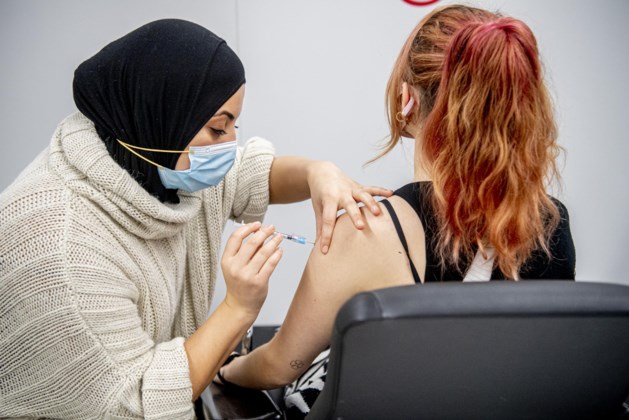© ROBIN UTRECHT
Antwerp –
The willingness to vaccinate in Flanders is high, but confidence in vaccines is less good. And that is mainly due to the young people, according to research by the University of Antwerp.
At the end of last year, the University of Antwerp investigated for the first time how much confidence the Flemish have in vaccines. Previous studies were based on European and Belgian figures. The results of the survey are encouraging at first glance. Approximately four in five Flemish people consider vaccines safe, important, effective and/or in accordance with their beliefs.
But the group that responded positively to all four variables is smaller. Only 57 percent are convinced that vaccines are safe, important and effective and consistent with their beliefs. The results surprised the researchers. In terms of vaccination readiness, Flanders is among the top in Europe. But confidence in vaccines is much less good: we are in the European middle bracket. Vaccinologist Pierre Van Damme (UAntwerp) sees the study as a warning. “Perhaps this predicts a lower willingness to vaccinate in the future. We have to work on that.”
(read more below the photo)
‘Only’ 40 percent of young people fully trust the vaccines. — © MARC HERREMANS – MEDIAHUIS
There is work to be done, especially among the younger population. While 68 percent of people over 45 fully trust vaccines, this is only 40 percent among 18 to 44-year-olds. According to Van Damme, a carefree childhood is probably part of the explanation. “Young people have had little exposure to infectious diseases such as measles, whooping cough and diphtheria. They were not confronted with it and received little information about it at school.” This is different for the elderly. They know very well from their youth the importance of vaccination against these diseases. The elderly are also more vulnerable and therefore more convinced of the importance of vaccines for their health.
Computer game
According to Van Damme, confidence can be boosted by better offering good information, especially to younger people. Most parents look for additional information before having their child vaccinated, but more than 40 percent state that this information is too difficult to find. With labels and clear websites, suitable information should be better distinguished from the many misinformation. Pharmacists and other health professionals should also be better supported in sharing information.
Infectious diseases and vaccines should be discussed more often at school. “We developed the Immune Patrol game together with the World Health Organization and a Danish game developer. The game explains issues such as immunity, vaccines and infectious diseases in a playful way.” From next school year, the game will be widely used in education.
Vaccination objectives
For Flemish Minister of Welfare Hilde Crevits (CD&V), it is important that vaccination confidence is strengthened. She emphasized this at the ‘vaccination health conference’ that she organized on Thursday. She launched new, tightened vaccination targets for 2030.
In concrete terms, the vaccination rate for whooping cough and flu in pregnant women must be increased to 90 percent. In the last study from 2020, vaccination against whooping cough during pregnancy had already increased to 85 percent and against flu to 62.3 percent. The ambition is also for 80 percent of people over 65 to be vaccinated against flu. Now that figure fluctuates around 60 percent.
